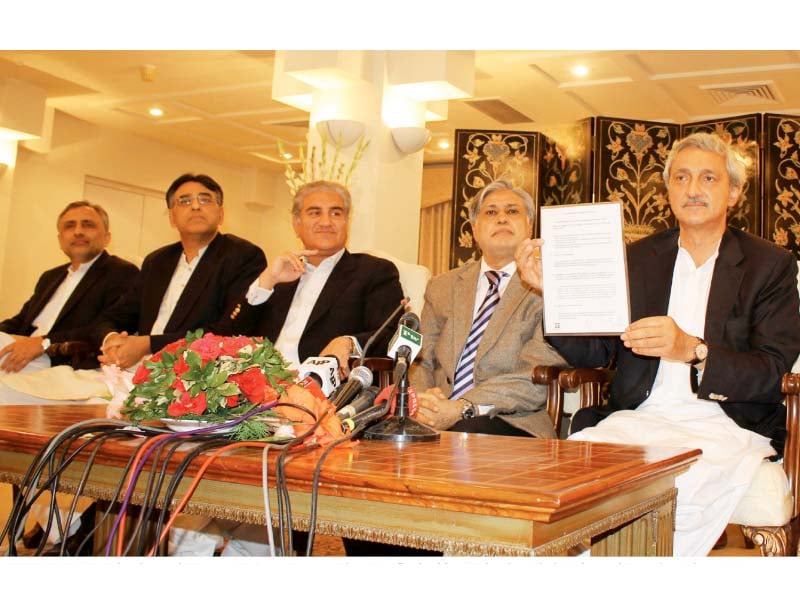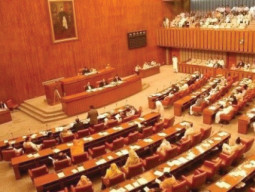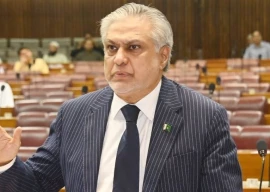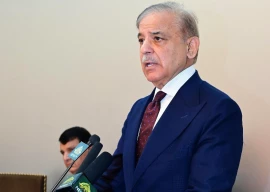
A debilitating confrontation over alleged fraud in the 2013 elections that had, at one point, paralysed the country and even threatened the democratic setup has finally been resolved. After months of fiery rhetoric and brinkmanship, the ruling PML-N and its arch nemesis, Imran Khan’s PTI, agreed on Friday on the scope of a long awaited judicial commission that is supposed to investigate alleged rigging in the 2013 elections.
Senior leaders from the two parties – Ishaq Dar and Anusha Rehman from the PML-N and Shah Mehmood Qureshi, Jahangir Tareen and Asad Umar from the PTI – announced they had reached a consensus on the terms of reference (ToRs) for the judicial commission at a hurriedly called joint news conference in the federal capital on Friday.
The PTI had staged a long march from Lahore to Islamabad in August last year, along with populist cleric Dr Tahirul Qadri, demanding Prime Minister Nawaz Sharif step down over alleged rigging in the 2013 elections. The march turned into a dharna in Islamabad’s red zone, where PTI supporters camped for 126 days.
However, Imran called off his unprecedented sit-in in wake of the December 16, 2014 deadly rampage by Taliban gunmen at Peshawar’s Army Public School. He then demanded the creation of a judicial commission to investigate the alleged electoral fraud.
The two parties held rounds and rounds of negotiations but an agreement on ToRs of the proposed commission remained elusive. On Friday, the senior leaders from the two parties said they have showed maximum flexibility in order to finalise the ToRs on which they had failed to reach an agreement on December 31, 2014.
According to the agreement, there are three major ToRs:
1.) The judicial commission shall inquire into and determine whether or not the 2013 general elections were organised, conducted impartially, honestly, fairly and justly in accordance with law (Article 218/3 of the Constitution).
2.) The judicial commission will determine whether or not the 2013 general elections were manipulated or influenced pursuant to a systematic effort or by design by anyone.
3.) The judicial commission will find out whether or not results of the 2013 general elections on an overall basis are true and fair reflection of the mandate given by the electorate.
The two sides agreed that “subject to the constitution, in the performance of its functions, the judicial commission may, if it considers appropriate, examine and consider any document, material or evidence relating to the 2013 general elections”.
They also agreed to introduce an ordinance to give a legal cover to the judicial commission rather forming it under 1956 Inquiry Commission Act.
They agreed that “the conduct of the inquiry [by the commission], submission of its report and the exercise of its functions under the ordinance by the commission shall not prejudice in any manner whatsoever any pending election petition relating to the 2013 general elections or appeal arising there from or any orders passed in such petition or appeal or any proceedings thereof before any election tribunal or court, which shall all continue and be decided in accordance with the applicable law”.
Speaking at the occasion, Ishaq Dar, the federal finance minister, said the points they agreed would be incorporated in the draft ordinance which the two sides agreed on December 31, 2014 and would be shared with all other political parties on the next working day, ie, Tuesday.
To a question, Dar said the judicial commission could form a special inquiry team, if it finds necessary. “We had all agreed in principle to form the commission last December, but the only sticking point was the wording of the agreement, which has now been resolved,” he added.
Dar hoped that after the formation of the judicial commission probably next week, PTI lawmakers would return to parliament and play their role for strengthening democracy and economy.
PTI Vice President Shah Mehmood Qureshi said that after the formation of the commission, his party’s core committee would decide whether or not to return to the lower house of the parliament.
Terming the agreement a positive step towards strengthening democracy and ensuring transparency in elections, Qureshi said: “The PTI spent 126 days in protest for a public cause and now everybody is a winner, no one is a loser and ultimately democracy would benefit from it.”
Imran terms it ‘a victory’
PTI chairman Imran Khan termed the government’s acquiescence to form the judicial commission a victory for the people of Pakistan and democracy, saying that it was the first time in the history of Pakistan that electoral rigging would be probed.
“The agreement will be a step towards ending the political mafias and their cohorts, who deny people their mandate through electoral fraud,” he said in a statement.
Published in The Express Tribune, March 21st, 2015.

































1714024018-0/ModiLara-(1)1714024018-0-270x192.webp)









COMMENTS
Comments are moderated and generally will be posted if they are on-topic and not abusive.
For more information, please see our Comments FAQ